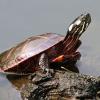Painting turtles: an introduction to species distribution modeling in R (Version 1.0)
By Anna Carter

Module Description:
In this exercise, students will gain insight into the process of building an occurrence-based species distribution model (sdm) by investigating the distribution of painted turtles (Chrysemys picta), a semi-aquatic species that is widespread throughout North America. Students will gain familiarity with available sources of climate and distribution data and acquire basic skills for handling geospatial data and spatially-explicit ecological datasets in open-source software. The module contains copy-and-paste code for R as well as example questions that walk students through the exercise and prompt them to critically consider the limitations of spatially-explicit data and occurrence-based distribution models for answering ecological questions. As written, the module does not explicitly examine whether the sdm is a ‘good’ model for painted turtles. However, this exercise is a simplified version of the vignettes in “Species distribution modeling with R” by Hijmans & Elith (2017) and can be extended to include more advanced exercises, such as statistical exploration of the BioClim variables, model validation, or the effects of climate change.
The author is supported by National Science Foundation grants DEB-1242510 and IOS-1257857 and the Minnesota Herpetological Society. This exercise draws heavily from the vignettes found in “Species distribution modeling with R” by Hijmans & Elith (2017).
Teaching Setting:
This module is a flexible, computer-based lab exercise for any number of students to complete, either individually or as a group exercise. Given that students have installed, or otherwise have access to, R and RStudio, the exercises can be completed during a single, 2-3 hour lab period. The exercises can act as a stand-alone assignment or as an introduction to concepts that are explored throughout a course. Students should have basic familiarity with typing and executing commands in the R/RStudio console and have familiarity with basic spatial concepts like latitude/longitude.
QUBES Citation:
Carter, A. (2018). Painting turtles: an introduction to species distribution modeling in R. DIG into Data FMN (2017), QUBES Educational Resources. doi:10.25334/Q4NQ40
|